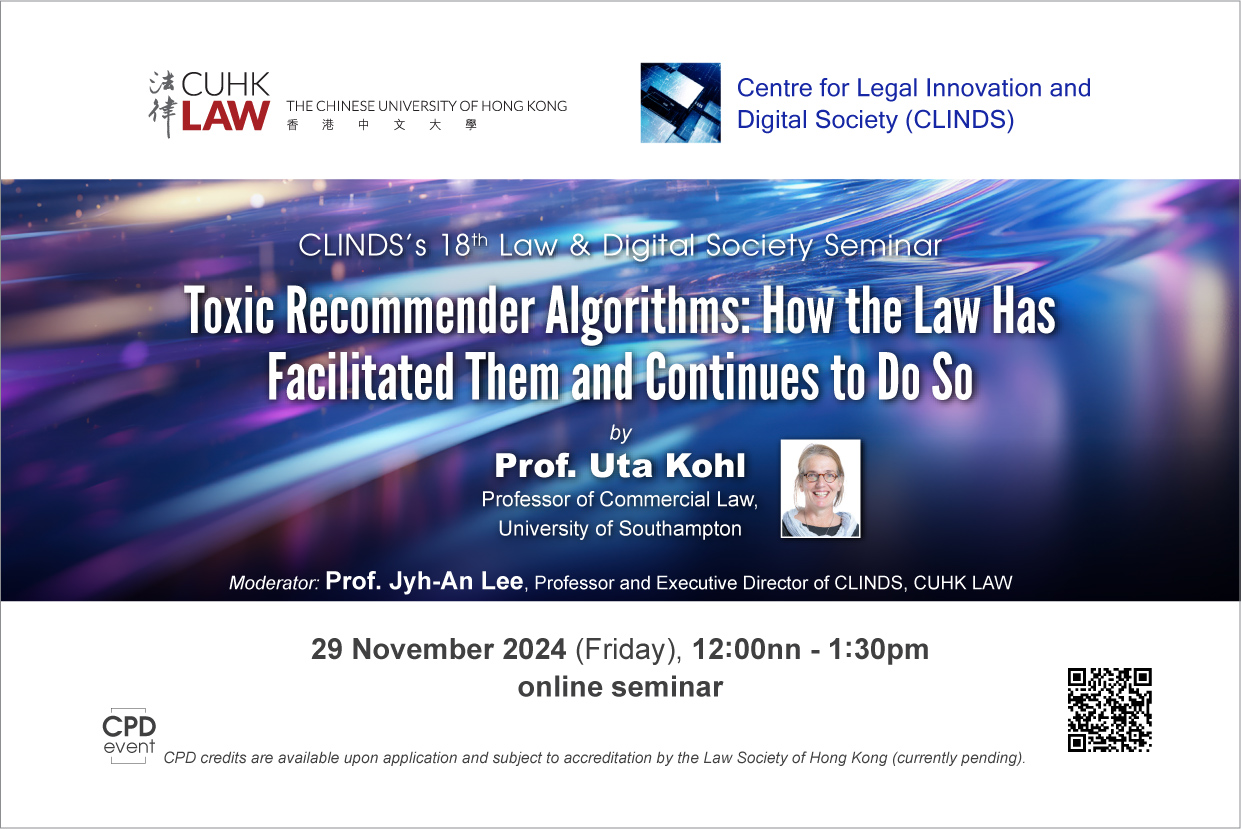Events
CUHK LAW CLINDS's 18th Law & Digital Society Seminar – ‘Toxic Recommender Algorithms: How the Law Has Facilitated Them and Continues to Do So’ by Prof. Uta Kohl (Online)
29 Nov 2024
12:00 nn – 1:30 pm (HKT)
Online via Zoom
Prof. Uta Kohl is a Professor of Commercial Law at the University of Southampton with research interests in the governance of the internet and technology as well as transnational corporations. She graduated from the University of Tasmania with a BA/LLB (First Class) and received a PhD in Law from the University of Canberra (2003).
Prof. Uta Kohl is the author of the monograph Jurisdiction and the Internet (CUP, 2007, ppb 2010) and the textbook Information Technology Law (5th ed, 2016, Routledge, with D. Rowland, A. Charlesworth). In 2013, Google Inc invited her to do further research on internet jurisdiction, which led to the symposium National Law versus the Global Internet – Re-Negotiating Westphalia? (2014) and the edited collection The Net and the Nation State (CUP, 2017). More recently, she has branched out into other online governance questions, like predictive analytics (see edited collection Data-Driven Personalisation in Markets, Politics and Law, CUP, 2021, with J. Eisler) and comparative privacy and hate speech regulation (see articles below and the funded Leverhulme project ‘Modern Technologies, Privacy Law and the Dead’). She also acted as the Human Rights Trustee on the Board of Trustees of the Internet Watch Foundation (2014-2020).
Prof. Uta Kohl has held various visiting positions, most recently as a visiting scholar at MIT (2023) in a collaborative project with Prof Nazli Choucri on corporate sovereignty on the internet.
https://cloud.itsc.cuhk.edu.hk/webform/view.php?id=13697402
Registration Deadline: 28 November 2024, 12:30 pm (HKT)
In this presentation I argue that the toxicity of the information environment is not the natural or inevitable result of Web2.0 and its characteristic user participation but has been promoted by social media platforms through their algorithmic design choices, as confirmed by a wealth of empirical evidence. Toxicity is profitable. Whilst the EU Digital Services Act 2023 and the UK Online Safety Act 2024 recognise this and seek to intervene through so-called ‘systems’ duties, they leave intact the law that has facilitated the active mismanagement of the online sphere by platforms, i.e. the extraordinary immunities granted to them in the early 2000s by the Electronic Commerce Directive (following s.230 of the US Communications Decency Act 1996). Interpreted expansively, these immunities have shielded, and to continue to shield, platforms from liabilities under civil, administrative and criminal law not just for third party wrongdoing on their domains, but for their own wrongdoing – on the basis that they are no more than ‘neutral’ or ‘passive’ pipes through which the content is channelled.
Language: English
*CPD credits are available upon application and subject to accreditation by the Law Society of Hong Kong (currently pending).


